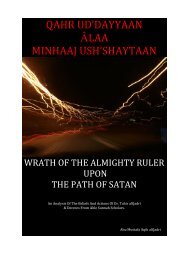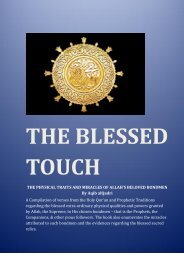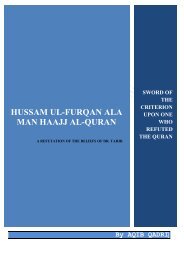The Book Of Prayer (Kitaab-ul-Salaat)
The Book Of Prayer (Kitaab-ul-Salaat)
The Book Of Prayer (Kitaab-ul-Salaat)
Create successful ePaper yourself
Turn your PDF publications into a flip-book with our unique Google optimized e-Paper software.
<strong>The</strong> presence of an image (of living objects) in the front, right, left or above the head of<br />
the person offering <strong>Prayer</strong>.<br />
<strong>Of</strong>fering the bow or prostration, or rising from the prostration before the “ Imaam” does.<br />
Reciting the Qur’ an in any position, except while in Qiyaam (standing).<br />
Ending the Qur’ an recitation in the bowing position.<br />
Resting the hands on the ground before touching the knees while proceeding for<br />
prostration, without a valid reason. Similarly, raising the knees from the ground before<br />
the hands are raised from the ground, while rising from prostration.<br />
<strong>Of</strong>fering <strong>Prayer</strong> in front of a grave, without a barrier in between.<br />
Not offering a “ Wajib” (Essential act) properly. For example not straightening the back<br />
during the bow and prostrations, or proceeding for the next position before straightening<br />
up in the "Qawmah" or "Jalsah".<br />
Reciting the Qur'an in an improper sequence. For example reciting Surah Kafiroon in the<br />
first “ Rakaat” (Cycle) and Surah Kausar in the second. This is "Makrooh" since it is<br />
against the sequence.<br />
Praying with eyes closed. However, it is better to do so if this increases one's reverence<br />
and devotion.<br />
A “ Makrooh” act makes the <strong>Prayer</strong> flawed. Such a <strong>Prayer</strong> sho<strong>ul</strong>d be offered again.<br />
Praying without the head covered is against the Sunnah of the Holy Prophet (peace and blessings<br />
be upon him). Praying without the head covered because one deems wearing a cap as a burden,<br />
or due to heat, is a lesser “ Makrooh” (tanzeehi). However, if it is done in contempt of <strong>Prayer</strong><br />
(e.g. deeming that <strong>Prayer</strong> is not important enough to merit wearing a cap for it), it is Kufr<br />
(blasphemy). If it is done to increase one's reverence and devotion, it is “ Mustahab”<br />
(recommended).<br />
RULES REGARDING CROSSING SOMEONE INVOLVED PRAYER<br />
It is a grave sin to pass in front of someone who is involved in <strong>Prayer</strong>. <strong>The</strong> Holy Prophet (peace<br />
and blessings be upon him) said: “ If the one who passes in front of someone involved in <strong>Prayer</strong><br />
knew what sin it entails, he wo<strong>ul</strong>d prefer to stand for a hundred years rather than taking that<br />
single step." In another Hadith it is reported "He wo<strong>ul</strong>d deem it good to be driven into the<br />
ground, but wo<strong>ul</strong>d not pass in front of someone involved in <strong>Prayer</strong>."<br />
If someone passes in front, it does not break the <strong>Prayer</strong>, but the one who passes will earn a great<br />
sin. Similarly one sho<strong>ul</strong>d avoid praying in a place where it becomes diffic<strong>ul</strong>t for others who need<br />
to cross.<br />
If a Sutrah (a thing which can act as a barrier) is placed in front of the worshipper, then there is<br />
no harm in crossing from a point beyond it. <strong>The</strong> barrier sho<strong>ul</strong>d be at least one arm in height and<br />
at least one finger in thickness.





